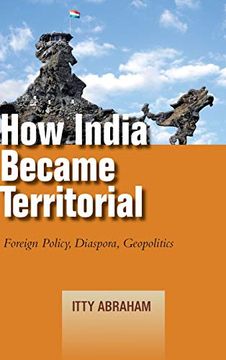Share
How India Became Territorial: Foreign Policy, Diaspora, Geopolitics (Studies in Asian Security) (in English)
Itty Abraham (Author)
·
Stanford University Press
· Hardcover
How India Became Territorial: Foreign Policy, Diaspora, Geopolitics (Studies in Asian Security) (in English) - Itty Abraham
Choose the list to add your product or create one New List
✓ Product added successfully to the Wishlist.
Go to My WishlistsIt will be shipped from our warehouse between
Monday, July 01 and
Tuesday, July 02.
You will receive it anywhere in United States between 1 and 3 business days after shipment.
Synopsis "How India Became Territorial: Foreign Policy, Diaspora, Geopolitics (Studies in Asian Security) (in English)"
Why do countries go to war over disputed lands? Why do they fight even when the territories in question are economically and strategically worthless? Drawing on critical approaches to international relations, political geography, international law, and social history, and based on a close examination of the Indian experience during the twentieth century, Itty Abraham addresses these important questions and offers a new conceptualization of foreign policy as a state territorializing practice. Identifying the contested process of decolonization as the root of contemporary Asian inter-state territorial conflicts, he explores the political implications of establishing a fixed territorial homeland as a necessary starting point for both international recognition and national identity―concluding that disputed lands are important because of their intimate identification with the legitimacy of the postcolonial nation-state, rather than because of their potential for economic gains or their place in historic grievances. By treating Indian diaspora policy and geopolitical practice as exemplars of foreign policy behavior, Abraham demonstrates how their intersection offers an entirely new way of understanding India's vexed relations with Pakistan and China. This approach offers a new and productive way of thinking about foreign policy and inter-state conflicts over territory in Asia―one that is non-U.S. and non-European focused―that has a number of implications for regional security and for foreign policy practices in the contemporary postcolonial world.
- 0% (0)
- 0% (0)
- 0% (0)
- 0% (0)
- 0% (0)
All books in our catalog are Original.
The book is written in English.
The binding of this edition is Hardcover.
✓ Producto agregado correctamente al carro, Ir a Pagar.

